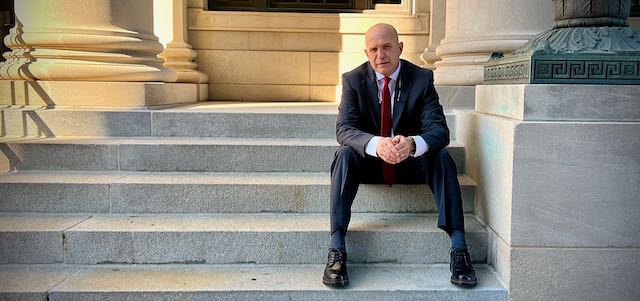Call 918 582 1313 for a free consultation.
This page is written to explain the Oklahoma state felony process. Each topic on this page has a brief description of that topic and a link to a page with more detailed description follow the link under each topic. If after reading this page you have questions, feel free to call or email me with your questions.
Finding the Right Courthouse
If you are charged in Oklahoma state court you will attend court at the county courthouse of the county you are charged in. Once formal charges have been filed against you your case will appear on either the Oklahom Sumpreme Court Network or On Demand Court Records, depending on the county you are charged in. If you are charged in federal court, in Oklahoma, charges have been filed against you in the Western District, in Oklahoma City, Northern District, in Tulsa, or the Eastern District, in Muskogee . If you are charged with a felony in federal court, this page is not for you. This page only describes the state felony process.
Hiring A Lawyer
If you are facing felony charges I suggest that you read Hiring the Best Lawyer for Your Case before you retain a criminal attorney. It may also be helpful to read Analyzing Criminal Cases so that you will better understand the process that good criminal lawyers go through to analyze criminal cases. Understanding how good criminal lawyers do their jobs will help you select the right lawyer for your case.
Posting Bond
If you are charged with a state felony you will generally be required to post a bond to get out of jail. It is important to hire a reputable bondsman, hiring a bad bondsman can cause a lot of problems. You should also be aware that while most bondsmen charge a fee of ten (10) precent of the total amount of the bond, there are bondsman that will negotiate their fee. You may be able to negotiate a fee less than ten (10) percent or find a bondsman that allows you to make a downpayment and to pay the remaining balance by payments. Read this before you hire a bondsman.
"Arrested on Probable Cause" or "Arrested on a Warrant"
Everyone charged with a felony offense is arrested, some are arrested by law enforcement on probable cause and others are arrested on a warrant after formal charges are filed. This page will explain the difference between being arrested on probable cause and being arrested after the issuance of a warrant.
The Formal Felony Process
The formal felony process begins with the filing of the "Information", this page explains the beginning of the formal felony process.
Initial Appearance/Arraignment
The first court appearance a defendant must make fter being arrested is the Initial Appearance/Arraignment, this page will explain what to expect during that appearance.
Preliminary Hearing Discovery
After the Initial Appearance/Arraignment a defendant's attorney can make the first request discovery in a criminal case, this page explains the discovery a defendant is entitled to in preparation for the preliminary hearing
Preliminary Hearings and Preliminary Hearing Sounding Dockets
After the Initial Appearance/Arraignment the next hearing a defendant must attend is either a Preliminary Hearing or a Preliminary Hearing Sounding Docket, this page explains what happens at those hearings.
First Opportunity to Plea a Felony Case
The preliminary hearing sounding docket and/or the preliminary hearing is the first opportunity in the criminal procedure process to plea a felony case, this page explains the different types of plea agreements.
District Court Arraignment
There are two (2) types of arraignmnets in the Oklahoma's felony criminal procedure process. The first arraignmnet (sometimes called the "Initial Appearance") occurs immeadiately after arrest and the "District Court Arraignment" occurs in front of a District Judge after the preliminary hearing. The purpose of both arraignments is the same, to make sure the defendant is aware of the charges he or she is facing and to schedule further hearings. This page explains what to expect at the District Court Arraignment.
Motion to Quash
If a defendant and his attorney believes thatn the magistrate that presided over the preliminary hearing made a mistake in "binding the case over" to District Court, the attorney has an opportunity to challenge that order by filing a "Motion to Quash". This page explains the legal basis for filing a "Motion to Quash" and gives examples of the "Motions to Quash".
No Issue Disposition
When a case is set for a plea, the judge will set the matter for a "no issue disposition". A "no issue dispostion" simply means that the judge expects that a plea will be entered on that date. This page describes why cases may be set for a "no issue dispostion" and the types of pleas that may be entered in a felony case. This page explains "no issue dispositions".
Motion Hearings
There are numerous types of motions that can be filed in a felony case, this page will discuss some of the more common types of motions and the circumstances that may lead to the filing of thosse motions.
Jury and Non-Jury Trials
Defendants have a constitutional right to a jury trial in all felony cases. In Oklahoma, the jury decides the appropriate sentence. However, if both the defendant and the state agree a case can be tried to a judge who would decide guilty or innocence and if guilty than the appropriate punishmnet.
Sentencing Hearing
A defendant that enters a plea or is found guilty at a trial will be sentenced. Sometimes the sentencing will occur immeadiately after the plea or trial and other times the case will be set for a seperate sentencing. This page discusses sentencing hearings in felony cases.
